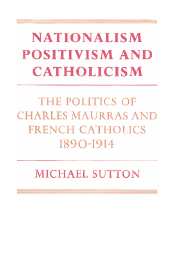 Nationalism, Positivism and Catholicism
Nationalism, Positivism and Catholicism Published online by Cambridge University Press: 22 September 2009
It remains by way of epilogue to put what has been recounted in a broader perspective, first by reconsidering the nature and significance of Maurras's nationalism and his appreciation of Comtian Positivism, and secondly by reviewing various aspects of the major Catholic controversy that his Positivist brand of nationalism led to.
Maurras's main borrowing from Comte was the idea of a subjective synthesis, which is basically the idea that thought and action can be made properly coherent through their being ordered in the service of a collective ‘Great Being’ in which the subject incorporates himself through sentimental (or existential) choice. It is this idea that Comte had intended to develop at length in his unfinished work Synthèse subjective, and it is also the idea that underlies the Système de politique positive. That Maurras's appreciation of this fundamental Comtian idea has been ignored or misunderstood is in large part due to the fact that Comte's own philosophy, as represented by the Cours de philosophie positive and the Système de politique positive together, has also been widely ignored or misunderstood. This in turn is in large part the legacy of Littré's reduction of Comte's Positivism to a form of scientism. In the late nineteenth century, however, there was one masterly essay of interpretation quite outside this scientist mould, namely The Social Philosophy and Religion of Comte written by Edward Caird (the prominent Scottish neo-Hegelian who was to succeed Benjamin Jowett as Master of Balliol College, Oxford in 1893).
To save this book to your Kindle, first ensure no-reply@cambridge.org is added to your Approved Personal Document E-mail List under your Personal Document Settings on the Manage Your Content and Devices page of your Amazon account. Then enter the ‘name’ part of your Kindle email address below. Find out more about saving to your Kindle.
Note you can select to save to either the @free.kindle.com or @kindle.com variations. ‘@free.kindle.com’ emails are free but can only be saved to your device when it is connected to wi-fi. ‘@kindle.com’ emails can be delivered even when you are not connected to wi-fi, but note that service fees apply.
Find out more about the Kindle Personal Document Service.
To save content items to your account, please confirm that you agree to abide by our usage policies. If this is the first time you use this feature, you will be asked to authorise Cambridge Core to connect with your account. Find out more about saving content to Dropbox.
To save content items to your account, please confirm that you agree to abide by our usage policies. If this is the first time you use this feature, you will be asked to authorise Cambridge Core to connect with your account. Find out more about saving content to Google Drive.